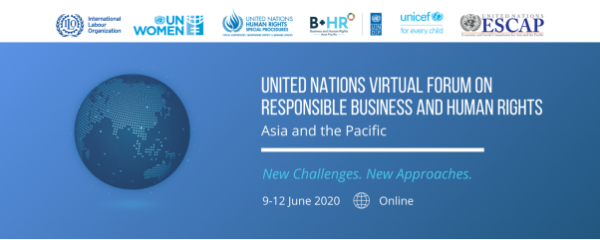BANGKOK, 11 JUNE 2020: A United Nations business and human rights forum this week cautioned that there could not be a return to business as usual in the Asia-Pacific region during post-Covid 19 recovery phase.
A joint video statement from the Asian and Pacific heads of six leading international organisations urged a focus on human and labour rights, the environment and the vulnerable – including children, women and indigenous peoples – when redesigning public and business policy responses and as global economic activity resumes.

According to the statement, the post-Covid-19 response should be seen as “an opportunity to … build back better, develop innovative solutions and create pathways to a more equal, inclusive and sustainable world.”
This year’s Responsible Business and Human Rights Forum takes place against a backdrop of unprecedented economic and social disruption caused by the continuing Covid-19 pandemic. Recent UN estimates are that the equivalent of 320 million jobs have been lost since the pandemic began and as many as 500 million people will be driven into poverty by the end of 2020, potentially undoing much of the progress achieved through the 2030 Agenda for Sustainable Development.
While many countries of Asia and the Pacific have seen success in limiting transmission and deaths from Covid-19, nearly all have paid the price in terms of increased unemployment, insecurity and poverty. Women, children and migrant workers are among those most likely to suffer as losses cascade through the region.
Over the next three days, the event aims to take stock of the virus’ impact and discuss challenges and opportunities for advancing responsible business and human rights in the region. Subjects under discussion include implementing national action plans for business and human rights, the implications for international trade, mitigating the impact of Covid-19 on workers and their communities, tackling gender bias and women’s burden of care in recovery plans, protecting human rights defenders, and assessing policy responses for migrant workers.
Normally held in Bangkok, the forum this year is virtual, with participants connecting on a dedicated internet platform. Interest has been high, with more than 5,000 delegates from governments, business, civil society organisations and workers’ groups signing up for the 35 sessions and side events.
Hosts of the UN Responsible Business and Human Right Forum include the UN Working Group on Business and Human Rights (UNWG), the United Nations Development Programme (UNDP), the International Labour Organization (ILO), the United Nations Children’s Fund (UNICEF), the United Nations Entity for Gender Equality and the Empowerment of Women (UN Women) and the United Nations Economic and Social Commission for Asia and the Pacific (ESCAP).








